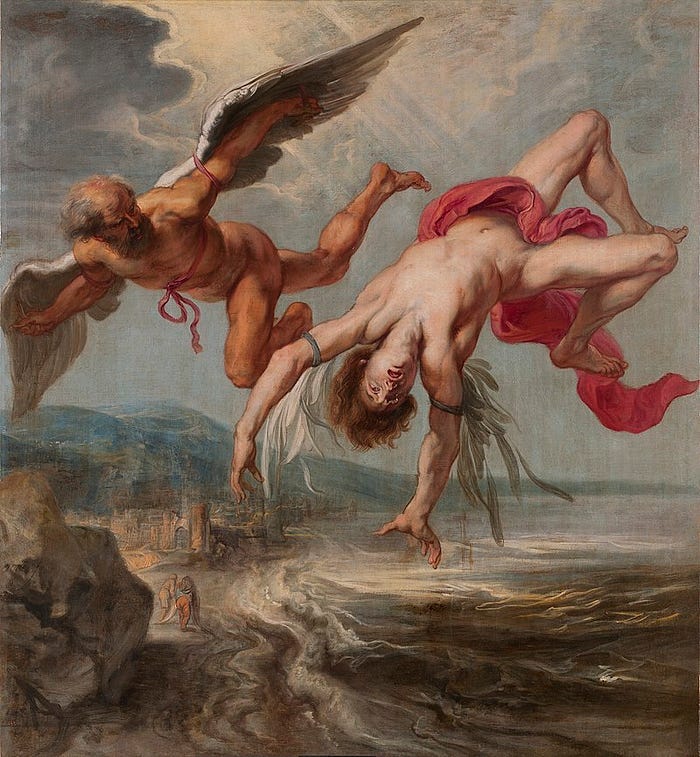Ancient Greece’s Advice On Being Humble While Pursuing Excellence
The hidden moral story for our day within the tale of Icarus

As kids, we find someone to idolize. It’s nothing we think deeply about at the time, we just latch on to a parent, sports star, or celebrity and heap our affection on them. We might even copy their style.
But it never really goes away as we get older.
Our idols just change. Many praise and adore geniuses, such as Elon Musk, Steve Jobs, Charlie Munger, Stephen Hawking, and Mark Zuckerberg. In a sense we almost deify them.
Placing any human being on this type of pedestal leads to problems, particularly in the case of someone considered a genius.
It can breed a destructive lack of humility.
Dr. Craig Wright in The Hidden Habits of Genius mentions these elite characters have a tendency to destroy things in their path. Usually it’s systems. But in the process, they also tend to destroy people.
Wright mentions Jobs got a certain joy in crushing smaller people and saw himself as an enlightened being. Furthermore, Zuckerberg thought nothing about using people’s personal data nefariously in college — personally calling them dumb for handing it over. In fact, he never stopped doing it.
While we’re not to the level of Jobs or Zuckerberg, some may idolize us. Likewise, we can easily look down on others.
We’re equally open to that destructive lack of humility as any titanic genius.
Many call this a modern problem, but it’s not. It existed in an ancient Greek society that was much like ours in many ways. In fact, the myth of Icarus specifically addressed a lack of humility.
But many miss the most important part of the story.
The Story Of Icarus Most Miss
“Let me warn you, Icarus, to take the middle way, in case the moisture weighs down your wings, if you fly too low, or if you go too high, the sun scorches them. Travel between the extremes.”
— Daedalus’ instructions to Icarus, Metamorphoses by Ovid
If you’ve never heard of the story of Icarus, I’ll give you a quick summary. A genius inventor named Daedalus is held captive by a tyrant. To escape, he fashions sets of wings made of feathers and wax.
He tries them out, figures out a set of flight rules, and shows them to his son Icarus. However, the boy ignores the rules. In his excitement, he flies too high and the sun melts the wax, which causes him to fall to his death.
Oscar Wilde and many others in modern times point out that at least Icarus flew, and the greatest tragedy isn’t trying.
That’s nice but has nothing to do with the story. It doesn’t end with the death of Icarus.
Daedalus uses the wings properly, “traveling between the extremes” and escapes after burying his son. In fact, in the Greek perspective, Daedalus is the focal part of the story, not Icarus.
Furthermore, the name Daedalus in Greek means “skillfully wrought.” The inventor’s lack of heat shielded wings aren’t the problem; they work fine. The boy’s lack of humility is the problem.
But this stretches beyond the tale into ancient Greek culture dealing with their pantheon of gods.
Ancient Greece And Walking The Middle Ground
“To the Greeks, the world was not just dramatic; it was a particular kind of drama. It was a tragedy. The highest virtue was excellence, but the highest sin was too much excellence — confusing oneself with a god.”
— The Invention of Yesterday, Tamim Ansary
In a certain way, the ancient Greeks may resemble you and me. They were constantly trying to be the best they could be at whatever their given field was. So, being the Jobs, Zuckerberg, or Hawking of their day was desired.
However, they also had this odd cultural situation going on we wouldn’t recognize: a pantheon of gods. Moreover, they weren’t always godlike. They had the failings of every human — lust, jealousy, greed, and anger.
While Ansary mentions humans could petition the gods, more likely than not, mortals were on their own. They achieved things by their own effort.
However, the gods did keep a watchful eye on those below, particularly those who achieved high levels of success. Those who took on godlike qualities became a target of these gods. Heaven unleashed humbleness upon them, often in terrible ways.
Therefore, the highest virtue could become the greatest sin quite easily if one weren’t careful.
The philosopher Aristotle gave his followers Daedalus-like advice for behavior, which he called the Golden Mean. It entailed finding the middle ground between extremes. This directed you to the proper moral path.
So, the proper mean between “excellence” and “too much excellence” led you to humility.
In other words, being the Jobs of your day was fine in innovation, but not the part where you destroy others. This was becoming godlike. It brought down the wrath of the heavens upon you.
A Lesson From Daedalus For Modern Times

As humans, we’ll always idolize those we admire. Plus, geniuses will always appear that reach high levels of success. It’s inevitable. So is the problem of a destructive lack of humility.
However, this issue we believe is modern, has ancient roots and tried and true methods for addressing it.
The solution is in the tale of Icarus. Although we should name it for what it actually is: the tale of Daedalus. Moreover, the problem itself doesn’t reside within our economy, technology, or culture; it resides within humanity.
We’ll always be tempted to step on that godlike pedestal. There’s an innate desire to be worshiped. With this, there’s that terrible habit of destroying the smaller people that prop us onto that platform.
But as Daedalus reminds us, we need to take the middle way — or as Aristotle might point out — the Golden Mean.
A lack of humility will eventually melt our wings. It’s not the flying device that’s the issue, the money paying for it, or the crowds cheering below. The person ascending causes the damage.
This is the hidden moral tale within the story. Ultimately, it’s a myth we all need to refresh ourselves on, especially in our current day.
There’s an acceptable mean between “excellence” and “too much excellence.”
-Originally posted on Medium 3/15/22


